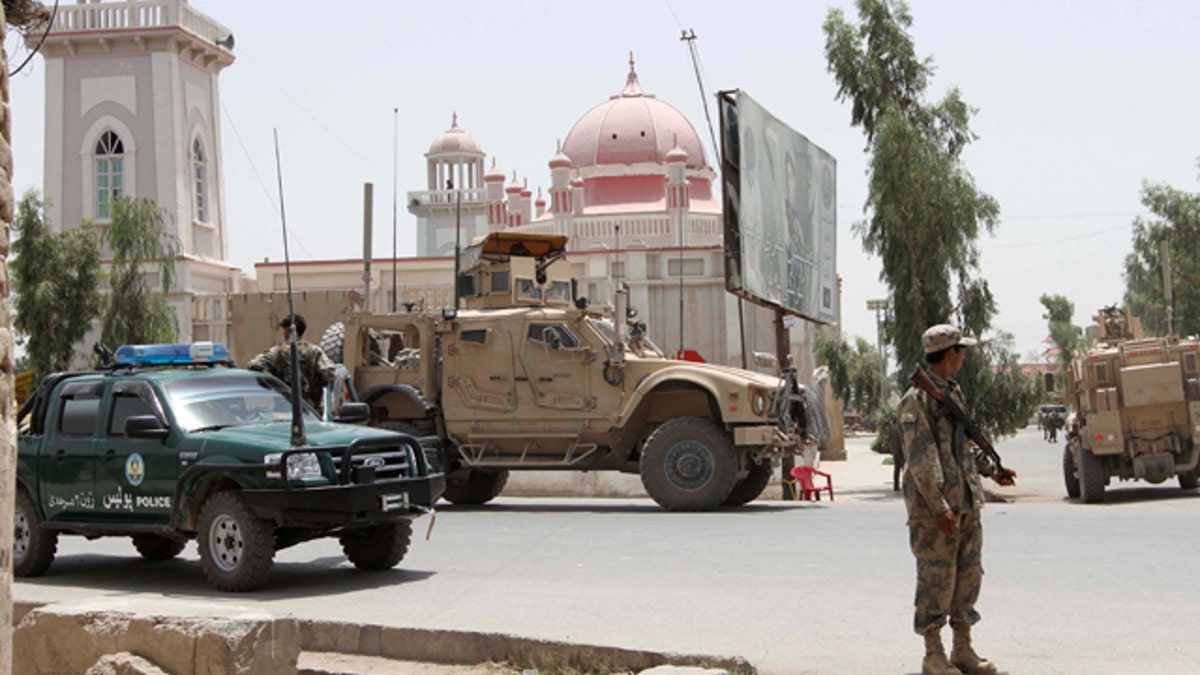
July 14: Afghan and U.S forces stand outside the mosque after a suicide attack in Kandahar, Afghanistan. (AP)
KABUL, Afghanistan – A suicide bomber hiding explosives in his turban blew himself up inside a mosque Thursday during a memorial service for the slain half brother of Afghan President Hamid Karzai, officials said. At least five people were killed in the attack, which added weight to fears that security would unravel with the death of southern Afghanistan's most powerful man.
The Sarra Jamai mosque in southwestern Kandahar had been filled with relatives and friends of Ahmed Wali Karzai, two days after he was shot at close range by a confidant at his home. President Hamid Karzai attended his brother's funeral Wednesday in Kandahar but returned to Kabul and was not at the memorial service.
The attacker appeared to be targeting Hekmatullah Hekmat, the head of the provincial clerical council, who was killed, according to Kandahar Gov. Tooryalai Wesa.
"There was a prayer going on and after that prayer the man came close to the director of the religious council and exploded," Wesa said. "It looks like he was targeting the director."
The Kandahar provincial government said all other high-ranking officials who had been at the ceremony were safe and had been taken to a secure location.
No one immediately claimed responsibility for the attack.
A young child also was among the five killed, and 15 people were wounded, including a parliamentarian, Bismillah Afghanmal, according to the Interior Ministry.
Officials believe the bomber got the explosives past security by hiding them in his turban.
The governor, who was attending the memorial, said he saw the man's turban explode. Provincial intelligence chief Gen. Mohammad Naeem Momin said authorities drew the came conclusion after examining the bomber's remains.
Tuesday's slaying of Wali Karzai -- who was head of the Kandahar provincial council, the influential Populzai tribe, and the Afghan president's confidant and emissary -- left the president without a powerful ally and threatened to create a power vacuum in the former Taliban stronghold and the site of recent military offensives by the U.S.-led military coalition.
Beyond his more official roles, Wali Karzai was also known as a master operator who played Kandahar's hard-line tribal and political factions against one another to retain ultimate control over the restive province.
Even the international alliance begrudgingly accepted Wali Karzai's sweeping influence in southern Afghanistan, despite their strong suspicions that he was involved in opium trafficking, smuggling and other criminal enterprises.
The mosque bombing was the second attack in Kandahar city on Thursday. A bomb exploded hours earlier near a police vehicle in the city, killing one civilian, provincial police Chief Abdul Raziq said.
As the conflict intensifies in the south and southeast of Afghanistan, the United Nations said Thursday that civilian deaths jumped 15 percent in the first half of 2011. The U.N. blamed a rise in insurgent roadside bombings and suicide attacks.
The U.N. said 1,462 Afghan civilians lost their lives -- many in the crossfire of battle between Taliban insurgents and Afghan, U.S. and NATO forces. During the first half of last year, 1,271 Afghan civilians were killed.
But many of the most contentious incidents continue to be international military strikes in which residents routinely claim civilians are killed.
In the latest such dispute Thursday, government officials in eastern Afghanistan accused NATO troops of killing six civilians in an overnight raid. More than 1,000 people poured into the streets of Khost province in anger, chanting "Death to America! Death to the government" and carrying the bodies of the dead on their shoulders.
The military alliance said the joint patrol with Afghan forces in Khost province killed six fighters from a militant group allied with the Taliban known as the Haqqani network and injured one civilian.
"I don't have any indication that we killed civilians," Capt. Justin Brockhoff told The Associated Press.
The raid took place in the village of Toora Worai in an area known as Matoon, about four miles from the provincial capital of Khost city.
"The coalition last night ran an operation in that village and unfortunately they were acting on an incorrect report that there was a meeting of Haqqani network commanders going on," said Mubarez Zadran, a spokesman for the provincial government. "The operation left six civilians dead."
Khost provincial council member, Gul Mohammad Zazi, said international troops stormed into the village around midnight and fired into the windows of houses. Zazi said the dead were not connected to the insurgency.
Brockhoff said that NATO and Afghan forces were going after a Haqqani leader who was responsible for attacks and weapons trafficking in the area.
"As the security force was clearing a compound in the area, multiple insurgents armed with AK-47 rifles and pistols, opened fire on the force," Brockhoff said. Among those killed in the firefight was a woman who was armed with a pistol and fired on the troops, he added.
He said the international troops administered first aid to the female civilian who was wounded and transported her to a medical facility.
Asif Khan, a resident of Toora Worai who lives next to some of those who were killed said all of the dead were civilians. A spokesman for local schools, Sayed Musa Majro, said the dead included a teacher and two students.
The French government also said a French Navy commando was killed Thursday in a firefight with insurgents in the east. And NATO said one of its service members was killed Wednesday in an attack in eastern Afghanistan. The coalition did not provide further details or the nationality of that service member.
